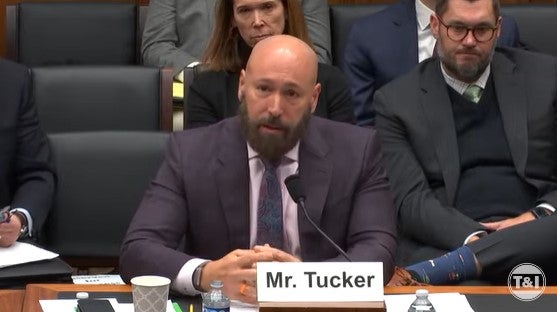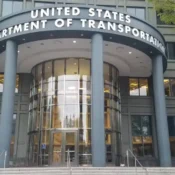
TIA warns Congress of rampant fraud in trucking
WASHINGTON — Rampant fraud in trucking has become an $800 million problem and the Federal Motor Carrier Safety Administration is not addressing the problem, according to the lobby representing 3PLs and brokerage firms.
“There’s a surge of malicious actors engaging in illegal activity, registering with FMCSA as carriers and perpetrating fraud, theft and holding freight hostage in situations without any legal consequences,” said Jeffrey Tucker, testifying on behalf of the Transportation Intermediaries Association at a hearing before the U.S. House Transportation and Infrastructure Committee on Wednesday.
“While this is obviously an economic problem, hurting consumers and businesses alike, it also raises safety and security concerns. Unfortunately, FMCSA is failing to enforce the law or investigate the tens of thousands of fraud complaints lodged with it.”

Asked during the hearing the types of fraud he sees being committed, Tucker, who is also CEO of Tucker Company Worldwide, a New Jersey-based freight brokerage, said the problem is criminals masquerading as brokers as well as trucking companies.
“It shouldn’t be seen as either carrier fraud or broker fraud. These are just criminals,” Tucker said.
He pointed to similar cases of fraud involving dispatch services that are often based in another country but are not required by FMCSA to obtain a license or registration, as is the case with U.S.-based services.
“FMCSA must stop dabbling in non-safety commercial considerations like what dollar amount a performance bond should be or what commercial terms are included inside a private contract between two parties. Until there are effective measures to address and enforce solutions for this issue, the continued dysfunctionality of the supply chain and its adverse impact on the broader economy will persist.”
Driver shortage?
In addition to freight fraud, Tucker addressed the contention made by sectors within the trucking industry as well as within the Biden administration that there is a driver shortage.
“There is no driver shortage nor has there been one,” Tucker testified. “That is a false narrative that may lead to unintended consolidation in the industry and to weakening America’s supply chain. A more than doubling of American carriers and an increase of 1 million drivers has occurred over the last 10 years. We must have a more nuanced conversation about this.”
U.S. Rep. Mike Bost, R-Ill., a former trucking company owner, challenged Tucker.
“If you’re out there dealing with it every day, there is” a driver shortage, Bost said, adding that the increasing legalization of marijuana among individual states is exacerbating the problem.
“You may have a lot of people who may be good drivers, but they prefer to smoke dope on the weekend and they can’t get clean by Monday. It’s not like having a beer on Sunday during a football game.”
Red Sea supply chain costs
Lawmakers were also concerned about the recent attacks on cargo vessels in the Red Sea by Houthi rebels and the ripple effect on the global supply chain.
“The initial impact is the delay of vessels arriving both in Asia and coming back to the United States,” testified Stephen Edwards, CEO of the Virginia Port Authority.
“So ocean carriers are rescheduling all of those ships and detouring around Africa” instead of going through the Suez Canal, he said, which will settle into a pattern of ships bound for the U.S. East Coast taking an extra seven days in transit.
“You can take the view … that the extra seven days could be offset by the loss of the Suez Canal fees. But that is not true for [vessels moving from] Asia to the Mediterranean or Asia to North Europe.”
Tucker added that another concern is special fees related to the disruption and delays that the U.S. Federal Maritime Commission is allowing ocean carriers to charge their customers.
“There is concern that maybe those fees are not applicable to the situation, and shippers would like to see more oversight on it,” Tucker said.



